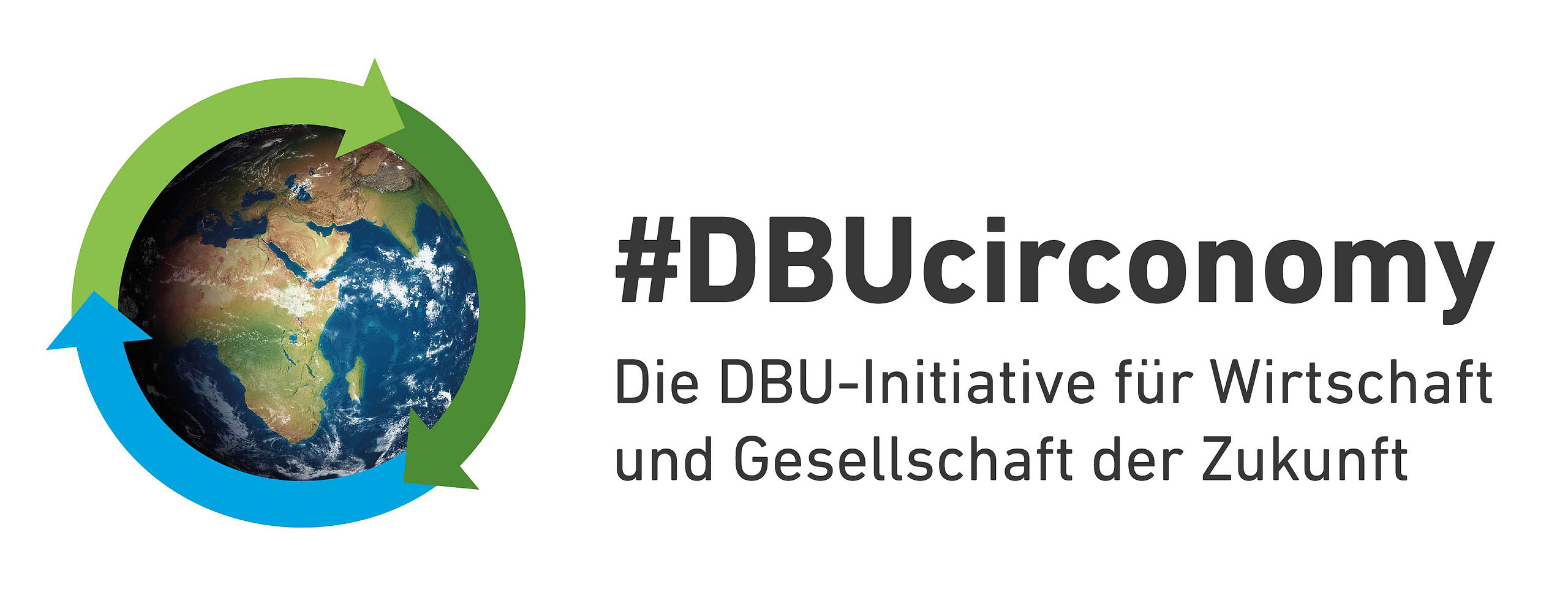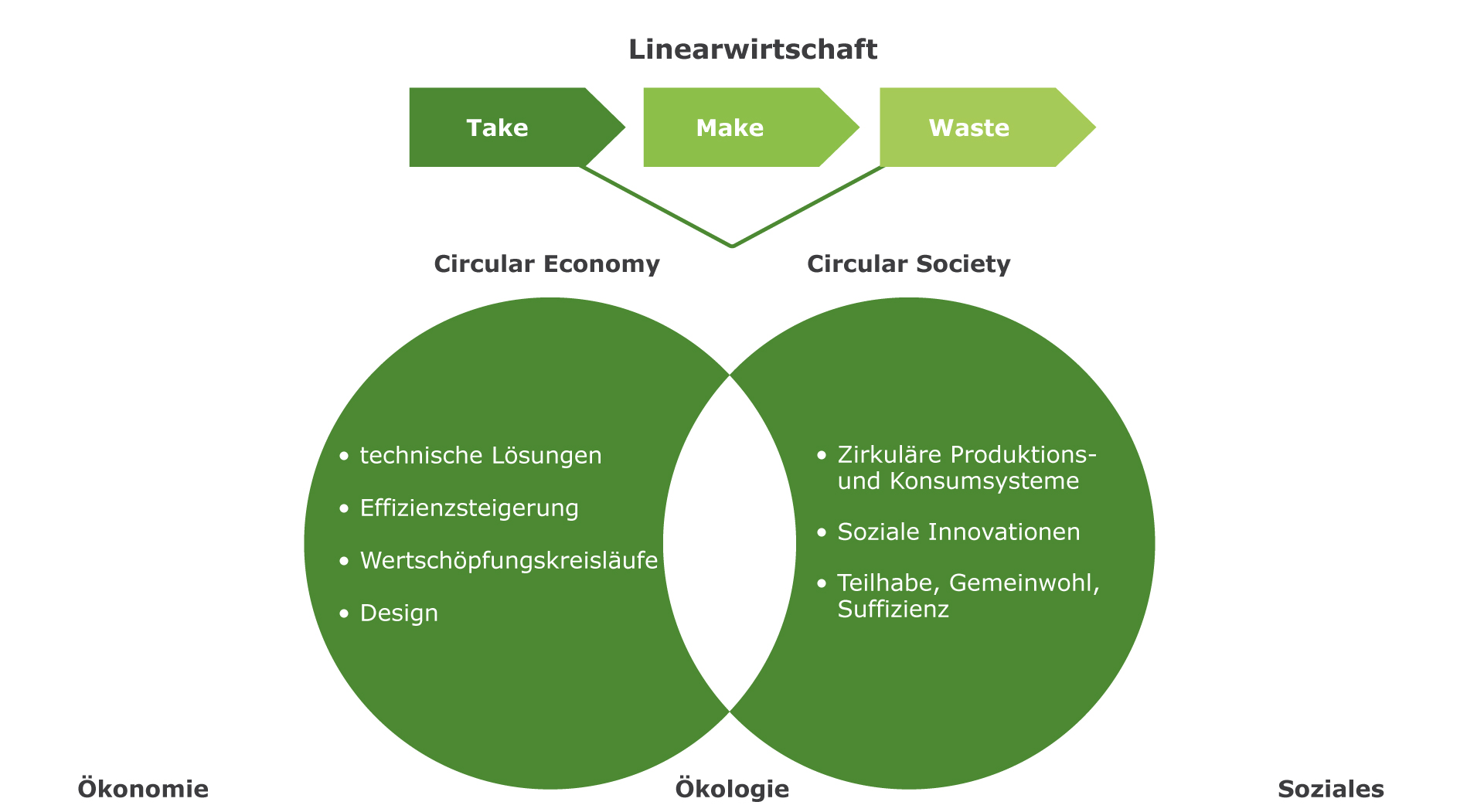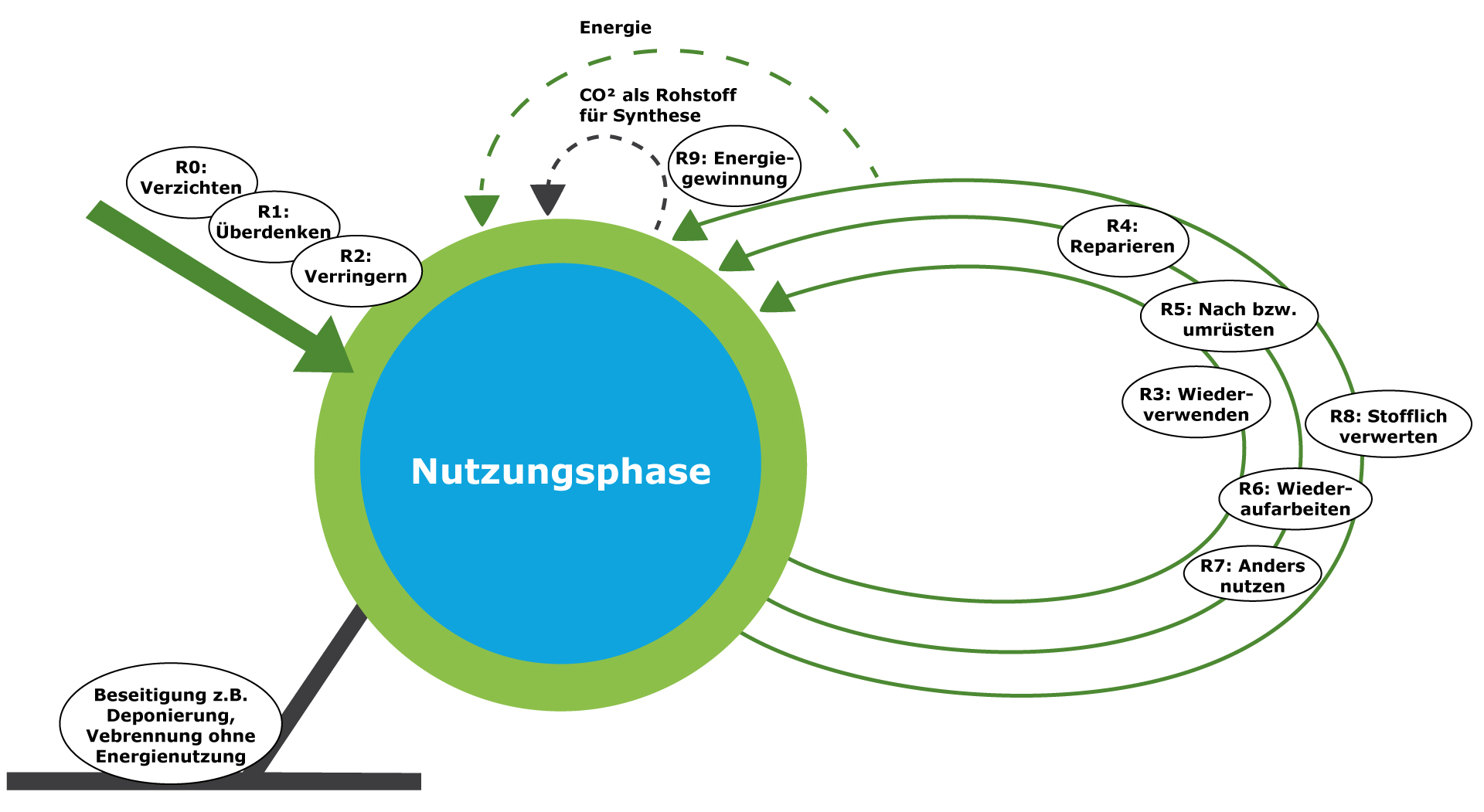#DBUcirconomy – The DBU initiative for the economy and society of the future
The Circular Economy offers a path toward a sustainable transformation of the economy and society. The DBU recognizes enormous potential in the Circular Economy and is therefore committed to its project funding and scholarship program. The submission procedure for projects is primarily open to small and medium-sized enterprises (SMEs) and research institutions.
From the Linear Economy to the Circular Economy
In recent years, a new paradigm of economic development has emerged with the Circular Economy, an extended circular economy: The principle of circularity is intended to replace the hitherto customary linear economy as quickly as possible. The creation and closing of cycles and the cyclical and cascading use of raw materials aim to decouple economic development and resource consumption in the long term. An important role in the implementation is played by product design and creation as well as the so-called R-strategies (see adjacent figure).
Circularity in country comparison or international perspective
Currently, less than nine percent of globally used resources are kept in the economic cycle. A comparison of countries reveals major differences: While just under 13 percent of materials are reused in Germany, the Netherlands, Belgium, France and Italy have significantly higher figures of between just under 20 and 30 percent.
Economic transformation – opportunities for new business models
Circular Economy is becoming increasingly relevant as a new guiding principle for economic transformation. It plays a prominent role in both the EU’s Green New Deal and the German government’s coalition agreement. The upcoming upheavals are sometimes compared to the Industrial Revolution. Instead of “take, make, waste”, in future it will be “reduce, reuse, recycle”. In almost all economic sectors and areas of need (such as housing, mobility, communication, nutrition, health and clothing), it is essential to put an end to the waste of resources. This is made possible, for example, through extended use, sharing models, avoidance, reuse and repair. These changes offer startups and established companies opportunities for new business models.


And further to the Circular Society?
While consistent circular transformation is generally seen as the key to sustainable economic development, the debate increasingly points out that the social perspective has so far been underexposed. The social aspects of sustainability are thus clearly neglected. The transformation of the linear economy must be flanked by socio-cultural change. In terms of social participation and just structural change, it is urged that the consequences for the living environment and everyday life, social commitment and jobs should also be taken into account, for example in the areas of occupational health and safety, professional activities, (vocational) training and qualifications, as well as everyday practices and consumption.

#DBUcirconomy: funding initiatives and scholarship focus.
The DBU recognizes enormous potential in the Circular Economy. With its initiative for the economy and society of the future, “#DBUcirconomy,” the foundation is taking a closer look at the topic – both in its project funding and in its doctoral scholarship program.
The submission procedure for projects under the funding initiative is primarily open to small and medium-sized enterprises (SMEs) and research institutions. Cooperation projects between SMEs and research institutions are expressly desired; the participation of other players (e.g. large companies) is possible. The current version of the DBU funding guidelines applies. Information on how to apply can be found here.
With two current calls for proposals , the DBU is focusing on the topics of “textiles” and “healthcare” within #DBUcirconomy:
- Funding initiative “Cross-company solutions for textile cycles”: The aim of this funding measure, which is being continued from 2022, is to close cross-company resource-efficient product, material and substance cycles by means of innovative technical and, at the same time, economically feasible solution approaches as well as innovative education and qualification formats. The deadline for submission is 31.03.2023. Read more here.
- CirculAid – Circular Economy in Healthcare” funding initiative: This initiative aims to achieve climate-neutral and resource-conserving healthcare. It is aimed at manufacturers of chemical-pharmaceutical products and medical devices, service providers and consulting companies in the healthcare sector, hospitals, rehabilitation clinics, nursing homes and medical practices, as well as universities and training centers in the medical field. The deadline for submission is 15.05.2023. Read more here.
In the doctoral fellowship focus area “Better economic management and living in cycles – transformation potentials of the Circular Economy“, questions from social science, humanities, law, economics and art disciplines, but also from technical, mathematical and natural science disciplines are addressed, more here.
Projects on the topic
Recycling, reducing waste, increasing energy and material efficiency, using renewable energies, digitizing, borrowing, sharing – the Circular Economy has many facets. The following exemplary DBU projects (in German language) show how it can be implemented.
- Heating circuit
- No energy without water
- Sustainability in the textile chain
- Club for sustainable packaging solutions
- Pure metal recycling through lightning-fast laser analysis
- Energy-efficient cleaning process for plastics recycling
- The energy transition in Germany and Eastern Europe as a game
- DBU green start-up funding: Cirplus – global marketplace for recycled plastics
- DBU-Green Start-up Funding: Circular.fashion – Software for the Design of Recyclable Textile Products
- DBU Green Start-up Funding: Soltani – Conserving Resources with Digital Support